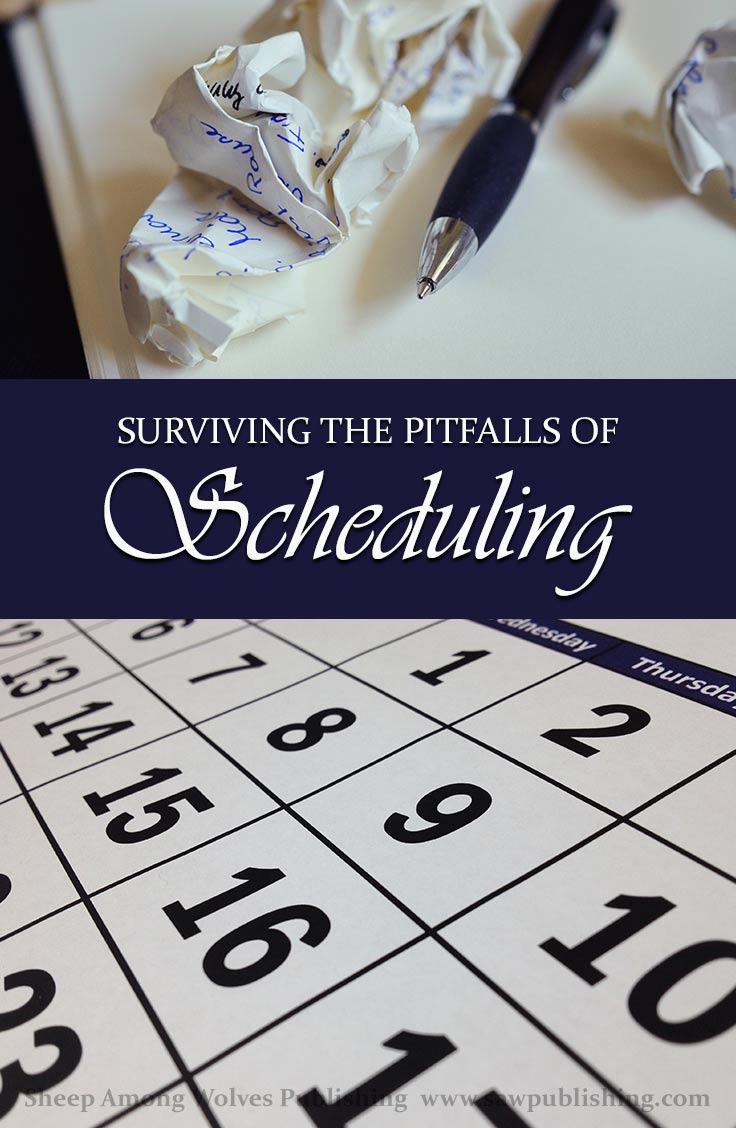Surviving the Pitfalls of Scheduling

How do you survive the pitfalls of scheduling?
Have you ever been part of a scheduling disaster? One of those days when you (according to the schedule) were going to blossom into the picture-perfect person you always knew you could be—but where you ended up feeling like an obstacle course survivor and a nightmare victim all rolled into one?
And someone had told you schedules reduce stress!
If you can identify with the above experience, chances are you fell into at least one of the pitfalls of scheduling.
There can be no doubt that a successful schedule takes wisdom, effort, and a bit of fine-tuning even after it’s been implemented. The good news is, a lot of the most discouraging pitfalls can be avoided from the beginning of the process.
Writing the Schedule of Your Dreams
 You sit down at your computer. You open an Excel spreadsheet. (You’re not quite sure if that’s the proper software for scheduling, but all the little boxes seem like they’d work well for timeslots!) You mark out twenty-four rows – actually, on second thought, you mark out forty-eight. After all, some tasks are going to take a lot less than an hour. For a minute you consider ninety-six quarter-hours, but that sounds a bit like overkill, and you can always schedule a couple of activities in the same time slot, after all!
You sit down at your computer. You open an Excel spreadsheet. (You’re not quite sure if that’s the proper software for scheduling, but all the little boxes seem like they’d work well for timeslots!) You mark out twenty-four rows – actually, on second thought, you mark out forty-eight. After all, some tasks are going to take a lot less than an hour. For a minute you consider ninety-six quarter-hours, but that sounds a bit like overkill, and you can always schedule a couple of activities in the same time slot, after all!
Then you pull out a spare notebook, and you make a list. You make a list of EVERYTHING you’d like to fit into your schedule. You’re getting excited by this point, and the ideas just keep coming. How about scheduling some time to do projects with the kids every afternoon? What about making a meal for someone at church once a week? Or going out for coffee with a friend?
This is getting really fun! You never realized how many great things there were to do with your time!
You turn over another notebook page. Hang on a second. Maybe we should count the things on this list. You start counting. And you start doing the math . . . you’ve got forty-eight half-hour segments in your day . . . and eighty-three items on your list . . . and you’ve just realized that you forgot to include “sleeping” and “folding laundry.”
The Scheduling Disaster
If you’ve ever had an experience like the above, chances are the scene ended in one of three ways.
1) You gave up the whole thing, and decided schedules weren’t really worth it after all.
2) You come up with a schedule that a superhero would have struggled to perform, and spent the next school year feeling guilty every day because you weren’t getting it all done.
3) You created a slightly more realistic schedule, but have been feeling like a slave ever since, because the effort required to stick to your schedule doesn’t leave room for anything else in your life.
Surviving the Pitfalls of Scheduling
None of the above options really equates to a successful scheduling experience. There are at least three vital principles to remember in creating any schedule.
1) A Successful Schedule Doesn’t Shoot for the Moon.
Don’t plan to over-achieve. It’s much better to get to the end of the day, and find out you have a spare hour to toss together a casserole for that family at church—even if this “perfect” scenario only happens once in two or three months—than to scrape together the time for a weekly “cook for my church family” project, only to feel like a failure when week after week finds you too time-pressured and exhausted to complete the task.
2) A Successful Schedule is a Guide, not at Dictator!
I don’t have any statistics, but I am guessing that the bulk of resistance to schedules in general, comes from the perception or experience that a schedule gets to rule your life. Nothing could be further from the truth. A schedule is a sketch—an outline of what you’d like your life to look like, on average, and provided nothing more important crops up to change your plans. It is not the whole picture. It is not an immovable commitment. It is not your taskmaster. It’s just a fancy little piece of paper that makes suggestions. Whether you follow them or not, stays a judgement call, even if you choose to comply ninety-five percent of the time.
3) A Successful Schedule Does Not Measure Personal Worth.
There’s a lot of worldview material we could cover here, since most of us concede that an arbitrary schedule is not a good personal-evaluation tool, yet for some reason we instinctively want to place undue stress on how consistently we complete the tasks we planned out for ourselves. This is not only unwise, it’s flat-out dangerous. It is the ultimate scheduling pitfall, because it makes all the others ten times deeper and darker whenever you fall into them. Remember, once again, your schedule is an instrument in your hands, not the other way around. It is a means, not an end. Sometimes the aim for a particular day may change. Sometimes our circumstances change. In either case, our schedule may become no longer appropriate. In neither case has our personal value altered at all.
Don’t Let Pitfalls Discourage You!
Creating a successful schedule comes more naturally to some people than to others. If floundering through pitfalls has been part of your scheduling experience, then don’t despair!
Keep your goals realistic. Keep your schedule flexible. And don’t let your adherence to it become the test of its value.
A successful schedule is worth the effort! I’d love to hear the tricks and techniques that have aided you in your quest for a workable homeschooling schedule. Just use the comments section below.
Wondering whether schedules actually make a difference in a homeschooling day? Consider our previous post:
You might also enjoy:

Have you ever wondered whether the search for wholesome, quality Christian literature is a feasible quest? Do good and great books even exist? And if they do exist, what do they look like, and where do you find them?

We all recognize the importance of a good vocabulary, but intentionally cultivating it can be another question. SAW Publishing’s Word of the Week (WOW) program is the perfect starting place, offering multiple ways to make vocabulary a family pursuit.

Wondering how to keep your toddler from crawling all over the table, claiming your attention, and interrupting school time? Take a look at these tips for including preschoolers in your homeschool day.

